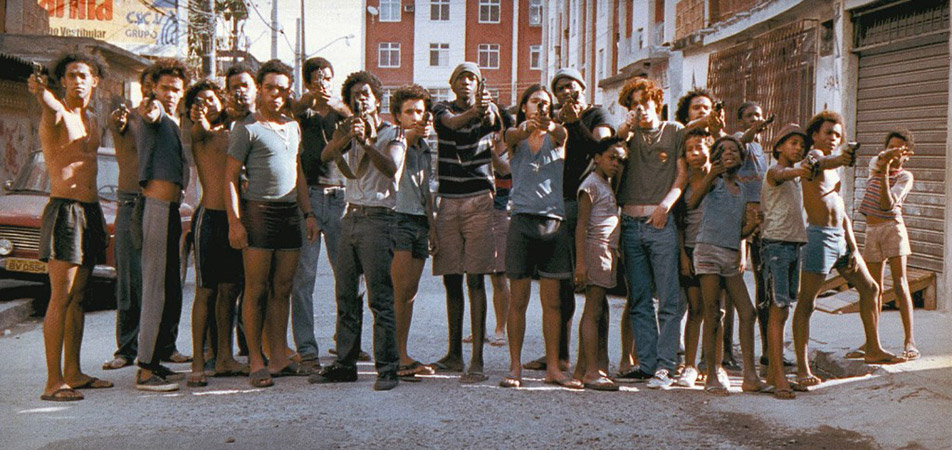City Of God Opening Scene
City Of God- Opening Scene Analysis

The opening scene of City Of god displays very typical stylistic use that can be seen throughout the film. Immediately, within the first five seconds the films kinetic style and unique use of cinematography can be detected. The first noise we hear is the diegetic sound of the street noise which clarifies the urban setting. Next another diegetic sound of a knife is utilised to elude to the theme of violence. Traditional Brazilian music becomes integrated as kinetic editing takes place, intertwining all of the diegetic noises together. Additionally, in hindsight the audience is aware they are in the present day due to the extremely cool -toned lighting. Soon, a chase after a chicken unfolds which has an added element of threat due to the low angle shots as we are aligned with a chicken. These shots emulate a very claustrophobic feel to a very otherwise upbeat scene which includes dancing and drinking. Various close-ups of the street life are edited together with the Brazilian music; the use of close-up continues the claustrophobic feeling. As the music comes to an end, a plate of blood is used in the mise-en-scene to once again elude to the theme of violence.
We then meet Lil' Ze for the first time- once again through a close up. His first line is an imperative demand-this tells the audience he has authority and is in charge. After his demand to catch the chicken, another upbeat and fast non-diegetic tune commences. We see lots of Guns in the mise-en-scene which seems a bit futile for catching a chicken. This comments on the mindless violence and how over the years it has developed to an extreme. As the chickens attempt to flee from danger, another theme is introduced- escapism. The chicken represents the citizens of the city who are desperate to escape and are always seemingly dragged back in.
Next we meet our protagonist with a stark change in mood. instead of an intimidating close-up, we are introduced to Rocket through a mid-shot. Instead of aggressively ordering people to chase a chicken he is having a casual conversation with a friend and instead of carrying a weapon he is holding a camera- a symbolic dichotomy that transpires throughout the film. The camera immediately cuts back to Lil' Ze to emphasise the contrast. Once again he is displayed as confrontational and violent through non-verbal communication such as aggressively pointing at the chicken as it races towards freedom. Additionally we see him smiling and laughing numerous times through close-ups which aren't expressed as genuine- more like sinister and exhilarated by violence and blood-shed. For the first time we see sun-light being used, however it's overwhelmingly bright and shining directly into the lens; it doesn't emulate or represent freedom or hope, it's merely just disorientating. Any time after this that the sky is shown it is not blue and beautiful; instead it's over-exposed, dull and hopeless. After many low angle shots of people's feet from the chicken's p.o.v shot, it finally attempts to break free. For a split second he takes off and catches a glimpse of the sky which is now exuberant and bright. Unfortunately this does not last long and the chicken is back on the ground in the City Of God within seconds.
To reiterate exactly who Lil' Ze is, Rocket is told "If Lil' Ze catches you, he'll kill you" to which he replies "yeah well, he's got to catch me first". After this line is delivered, Lil' Ze enters the frame in slow motion as a non-diegetic uneasy sound is played and his gun glistens in the sun- the audience is now certain of who is who. As Rocket is framed in between the Police, the chicken and Lil' Ze's gang we hear his Voiceover for the first time. Straightaway it changes the atmosphere because it is calm and gentle- a completely difference atmosphere compared to the one created by a hectic chicken chase with fast music and Lil' Ze screaming commands that is edited highly stylised and kinetic. The turning point go the opening takes place within the next transition- a slow motion transition shot that rotates around Rocket multiple times before switching to the next scene with a match cut. Immediately, we can see there is a stark change in cinematography and the scene is now extremely warm toned. Instead of buildings towering over the characters, all houses are one-story and they're all the same level. As a younger Rocket stands with his hands on his knees he now faces the fear of being a goalie rather than facing the fear of a violent gang and it's maniac leader. In this shot, the big open sky hangs above him. It's almost as if we're being told the development of the city as a character has not benefited anyone. We are told this with an immediate moment of peace and tranquility in the sixties- there's no fast music or kinetic editing. Then Lil' Dice enters the scene causing minor conflict; but just enough to hint even when they were young he was an evident agent for chaos. Then the informal and relaxed Voiceover returns combined with a camera shutter non-diegetic noise which becomes symbolic throughout the film. Rocket tells the audience "sorry I forgot to introduce myself", once again portraying the relaxed style of VoiceOver that guides us through the film.
Comments
Post a Comment